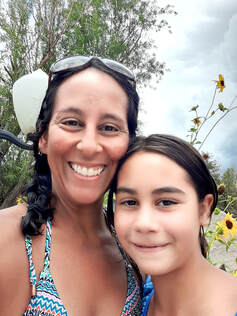Me and my daughter who is a Type 1 Diabetic
Mastering Lifestyle Balance with T1D or other chronic conditions
Perimenopuase can begin as early as our mid- late thirties and can present in many ways. The hallmark symptoms include hot flashes, brain fog, disrupted sleep, insomnia, changes in your period, weight management issues, irritability and more. When you are caring for a kid with a disability it is easy to write off these issues as par for the course when you are spread thin caring for kids. But, it is so important to take care of yourself while you take care of them. They are learning self care by watching you!
TYPE 1 DIABETES HIT US LIKE A TSUNAMI.....
My daughter was born with a few gut issues as a baby. I worked with traditional medical practitioners to get to the root of things and was told she was fine. Fast forward 8 years and she was losing weight, had constant abdominal pain and was overall miserable! We went to her pedi appointment and my concerns were dismissed. A month later she fell getting out of bed and begged to see a doctor. I was sure they would tell me again that she was fine, but bloodwork was finally ordered and soon after it came back we were off to the hospital knowing her blood glucose was over 600 and her A1c was 16!
The first thing the nurse told us was that my daughter could eat whatever she normally ate- "she just had to take a little medicine first." This blew my mind!!! I have been a life long nutrition fanatic and had over 15 years of fitness & physical therapy training. I knew those words were intended to take away fear but they could have just as easily set the stage for disaster. She did not know our lifestyle, diet choices or anything else about us. Lucky for us, we already ate healthy and focused on play based exercise and sports, but for many families this is not the case.
Living with diabetes now for 2.5 years we have learned a lot! Year 1 was survival mode for all. My daughter was exhausted trying to manage school and her medical needs. Year two was a 50/50 split of fatigue and overwhelm and now in year 3 we have all found a groove. Her A1c is consistently around 6.4 and for an 11 year old in puberty this is great! There are key strategies we use to help her live her best life.
Over the 2.5 years since diagnosis I would say that I went through a similar experience of fatigue and overwhelm as my daughter. I am 46 now. So I was just in the early phases of perimenopause when she was diagnosed. I had no symptoms at all and then overnight I was not sleeping, overwhelmed and soon exhausted. That is when then the brain fog set in. I could barely function at times. The lesson I learned is that moms of kids with disabilities need a support team to keep themselves afloat. They need to take special precautions to maintain their well being during perimenopause to prevent and minimize symptoms that may have long lasting effects. The STRESS of having a kid with a disability like T1D is FOR REAL... Lack of sleep, stressed eating, stressed living all promotes a trend to our own blood sugar dysregulation and all of the symptoms that go along with it like brain fog, disrupted sleep, weight loss resistance and more. This stress can lead to hormone dysregulation and more.
TYPE 1 DIABETES HIT US LIKE A TSUNAMI.....
My daughter was born with a few gut issues as a baby. I worked with traditional medical practitioners to get to the root of things and was told she was fine. Fast forward 8 years and she was losing weight, had constant abdominal pain and was overall miserable! We went to her pedi appointment and my concerns were dismissed. A month later she fell getting out of bed and begged to see a doctor. I was sure they would tell me again that she was fine, but bloodwork was finally ordered and soon after it came back we were off to the hospital knowing her blood glucose was over 600 and her A1c was 16!
The first thing the nurse told us was that my daughter could eat whatever she normally ate- "she just had to take a little medicine first." This blew my mind!!! I have been a life long nutrition fanatic and had over 15 years of fitness & physical therapy training. I knew those words were intended to take away fear but they could have just as easily set the stage for disaster. She did not know our lifestyle, diet choices or anything else about us. Lucky for us, we already ate healthy and focused on play based exercise and sports, but for many families this is not the case.
Living with diabetes now for 2.5 years we have learned a lot! Year 1 was survival mode for all. My daughter was exhausted trying to manage school and her medical needs. Year two was a 50/50 split of fatigue and overwhelm and now in year 3 we have all found a groove. Her A1c is consistently around 6.4 and for an 11 year old in puberty this is great! There are key strategies we use to help her live her best life.
Over the 2.5 years since diagnosis I would say that I went through a similar experience of fatigue and overwhelm as my daughter. I am 46 now. So I was just in the early phases of perimenopause when she was diagnosed. I had no symptoms at all and then overnight I was not sleeping, overwhelmed and soon exhausted. That is when then the brain fog set in. I could barely function at times. The lesson I learned is that moms of kids with disabilities need a support team to keep themselves afloat. They need to take special precautions to maintain their well being during perimenopause to prevent and minimize symptoms that may have long lasting effects. The STRESS of having a kid with a disability like T1D is FOR REAL... Lack of sleep, stressed eating, stressed living all promotes a trend to our own blood sugar dysregulation and all of the symptoms that go along with it like brain fog, disrupted sleep, weight loss resistance and more. This stress can lead to hormone dysregulation and more.
What does coaching for women caretakers of T1D kids look like?
6 Week Kick start Program:
Let's figure this out together! Let my experience as a T1D mom and expertise in women's health help you to thrive and find the new normal as a mom of a child with Type 1 Diabetes. We will work together in weekly 1:1 sessions to work through hurdles around self care, navigate motherhood through the lens of Type 1 Diabetes and weave together a whole family health plan if you like!
6 Week Kick start Program:
Let's figure this out together! Let my experience as a T1D mom and expertise in women's health help you to thrive and find the new normal as a mom of a child with Type 1 Diabetes. We will work together in weekly 1:1 sessions to work through hurdles around self care, navigate motherhood through the lens of Type 1 Diabetes and weave together a whole family health plan if you like!
- Week 1: Re- Imagining Life Balance
- Week 2: Identifying your greatest needs and signs of perimenopause
- Weeks 3-6 Working through Sleep, Nutrition, Movement and Stress Management to Find your Flow
- Bonus modules: Meditations, HRV tracking benefits, Brain Fog Relief hand out, checking in with your own Blood sugar
- Add ons- individualized workouts, personalized HRV tracking support, Blood sugar management in perimenopause (not included in base commitment)
Perimenopause Symptom Questionnaire
1. Do you have trouble falling asleep?
2. Do you wake 1 or more times during the night?
3. Do you have trouble finding words more than on rare occassions?
4. Do you get "hangry" when you go too long without eating?
5. Have you experienced increased belly fat despite not changing what you eat or your lifestyle?
6. Have you experienced changes in your skin or hair?
7. Do you get super sleepy after a large meal with lots of carbs?
2. Do you wake 1 or more times during the night?
3. Do you have trouble finding words more than on rare occassions?
4. Do you get "hangry" when you go too long without eating?
5. Have you experienced increased belly fat despite not changing what you eat or your lifestyle?
6. Have you experienced changes in your skin or hair?
7. Do you get super sleepy after a large meal with lots of carbs?
If you answered "yes" to more than 1 of these questions, there is a likelihood that your body is in the midst of a hormonal shift. You do not need to "survive" this stage of life and IN TRUTH, addressing the root cause of these symptoms now may help you to ward off cardiac issues, depression and more.
This website uses marketing and tracking technologies. Opting out of this will opt you out of all cookies, except for those needed to run the website. Note that some products may not work as well without tracking cookies.
Opt Out of Cookies

